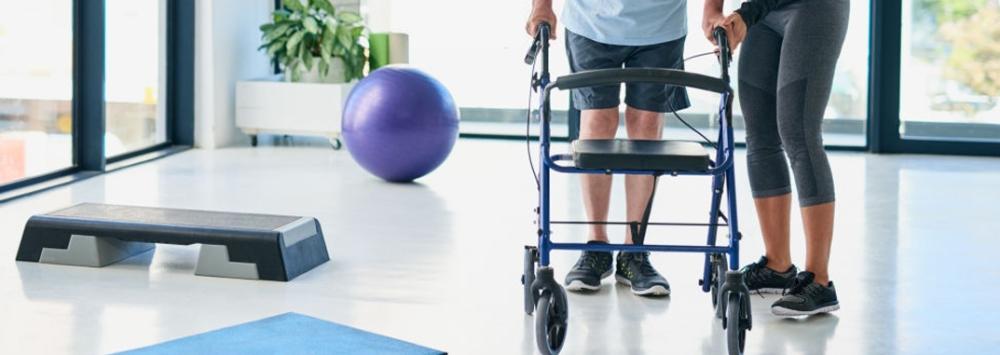
Six Must-have Aids for the Elderly in 2020
Sally Madeley-Carr, OT08 Sep 2020
Innovation and new ideas drive the world of rehabilitation and daily living aids. As we get older, new challenges arise connected to the physical tasks of everyday life. Luckily there is an ever-growing supply of aids for the elderly which may make a big difference - here we'll rundown six of the best.
1. Wheeled Walking Aids
In cases where someone's mobility has significantly deteriorated, wheeled devices which support the body may help. While many people are initially resistant to this type of equipment, it is growing in popularity and may have a dramatic and positive impact on daily life.
With the goal of continued independence, most people are open to the opportunities mobility aids like this may facilitate. A rollator, for example, which is essentially a robust walking frame with wheels, may help get around the home or assist someone get to and from the shops or on visits to friends or family.
Rollators are available with integral seats, shopping bags, baskets, brakes and a whole host of other features. Combined, these make them excellent pieces of kit for someone who might otherwise be housebound or reliant on others to get around outside.
The popularity of rollators in the UK was enhanced when the then nearly 100-year-old Captain Tom Moore used one for his inspirational 2020 campaign to raise funds for NHS charities.
Using his Drive X-Fold rollator, Captain Moore walked sponsored laps of his garden. With an original target of one hundred 25-metre laps, he aimed to raise L1000, but soon the global publicity meant he was able to aim much higher.
Quickly passing new landmarks of L5,000 and L20,000, he soon swept past the huge figure of L500,000. With more appearances on national TV, radio and extensive newspaper coverage, he eventually raised an astonishing total of over L30million.
This meant that Captain Moore, using his walking frame with wheels, had earned a record donation for a single campaign on the JustGiving website, dwarfing the previous mark of L5.2million. More than 1.5 million people contributed, which was another record.
2. Aids For Putting on Socks
The challenges of becoming older are not always things to which people give much consideration when they are young, physically fit and flexible. Not being able to touch your toes when you're younger is not necessarily a problem, but as your body's tendons shorten with age and flexibility at the waist becomes more restricted, it may become more difficult.
A practical problem which may arise in these circumstances, is difficulty in putting on socks and underwear. While many people adopt new techniques with their underwear, like swinging the garments over the feet one by one, socks and shoes may be harder to deal with.
The simple issue for many people is being able to stretch far enough to hook the sock or stocking over their toes in order to then pull them up over their feet. Without the reach or flexibility to do this, putting on socks can be a real problem.
Essential Aids devotes a whole category to innovative devices specifically designed to solve this issue.
What most of these aids have in common is that they require the sock or stocking to be manually 'loaded' into a device which then sits on the floor. The foot is then placed inside the device and then pulled up the ankle.
This means the user is not required to reach as far as their own toes or even the foot itself, in order to get the sock on.
Some of these aids have a wire framed construction, like the popular 'Dorking Stocking Donner'. Others feature a 'gutter' into which the foot is slipped, and cord handles which enable the 'pulling up' process. One example of this type is the 'Etac Socky, Short Stocking Aid'.
It is important to note that most of this type of equipment may take time to get used to. There is a new technique involved, but most people are able to master it in a relatively short period.
3. Walking Sticks
The ubiquitous walking stick is possibly the original aid for the elderly. It offers easy support when moving around, is convenient to store and available in lots of styles and materials.
Essential Aids supplies a wide range of conventional sticks, made from wood or lightweight aluminium. If a standard stick does not deliver the required stability, it may be worth considering one which has more than one leg.
Tripod and tetrapod walking sticks offer great support and have the advantage of standing up alone without needing to be leant against something. This is a feature which appeals to many elderly people who might have difficulty reaching down to the floor to pick up a fallen walking stick.
While these devices do come with an increase in weight, many models are available made from aluminium and these are dramatically lighter than old fashioned steel versions.
Tripod sticks tend to be marginally more maneuverable than the four-legged tetrapods are the most stable, but may also be heavier. Walking speeds may be slow when using this type of equipment and they can be awkward when trying to lift on and off of buses, for example.
The handle is an important part of any walking stick. If you're using one a lot, it is worth considering one which spreads weight evenly across the palm.
Narrow handles may prove painful after a while, so wider handles which are ergonomically designed to match the hand's contours are a valuable design enhancement and may make a significant impact on comfort.
4. Reaching Aids and Grabbers
One common complaint when one enters old age is a reduction in general flexibility. As touched on above, this can impact our ability to put on clothing, but also for picking things up from the floor or retrieving items from high shelves.
Reaching aids are useful if you find yourself in this situation, with most of the commonly found devices sharing a basic design. They comprise an aluminium shaft of up to 90cm in length, with a trigger at one end which controls 'jaws' at the other.
These devices are versatile and have many applications around the home. They are particularly useful for people who struggle to bend at the waist and who regularly need to pick things up from the floor. They also work very well as litter-pickers and are a familiar sight being used for that purpose.
Essential Aids supplies a wide range of reachers, many which fold in the middle, making them easy to store in handbags.
Some models have suction tips on the jaws, giving them extra purchase on flat sided objects. Some also have magnetic tips - great for collecting small metal objects.
5. Perching Stools
The ability to stand unaided at a sink or kitchen worktop is something many people take for granted before they reach later life. Whether it's preparing food or brushing your teeth, there are various day-to-day tasks which require one to stand up for fairly prolonged periods.
If this becomes difficult, a perching stool is something to consider. These are tall stools which have a slightly tilted sitting surface, rather than a flat one. The idea here is to keep one's feet flat on the floor, while 'perching' on the leading edge of the stool's seat.
This provides the user with adequate support to 'semi-stand' and keep both hands free to conduct the necessary task. This makes food preparation, washing up and a whole host of other jobs much easier to undertake.
Perching stools have an advantage over simple tall stools in that the user doesn't have to climb up to sit one, or down again afterwards. For elderly people, this is a significant advantage.
Essential Aids' extensive range of perching stools features units with backs and arms and all are easily height adjustable.
6. Kitchen Equipment
Many people suffer with arthritis later in life and often this particularly affects the hands and fingers. This in turn may make it uncomfortable or painful to use standard knives and forks, as well as items like tin openers.
Essential Aids' kitchen range features hundreds of ingenious products which aim to reduce this type of discomfort.
Simply using knives and forks with larger than standard grips makes a big difference for some people. These come as either purposely design cutlery, or as oversize grips which fit around standard knives and forks.
Larger handles are usually less painful on fingers and are easier to control.
Automatic tin openers and bottle openers are other examples of kitchen tools which take the physical strain out of the tasks at hand. Essential Aids supplies a wide range of these too.
Another innovation is the use of L-shaped bread-knives and graters. Rather than the standard 'straight' blade style, these have a handle which is nearly at a right angle to the blade. This keeps the wrist in a neutral position, making it easier to control and requires less strain on the wrist and forearm.
A similar design is deployed in some garden tools for the elderly.

Sally Madeley-Carr, OT
Sally qualified as an Occupational Therapist in 1996 and is a well-respected professional in the field of rehabilitation equipment and living aids. She has worked in private practice and within the NHS, developing a broad experience with adults and children. Click here for Sally's registration with the Health and Care Professions Council. The HCPC regulates health, psychological and social work professionals in the UK.